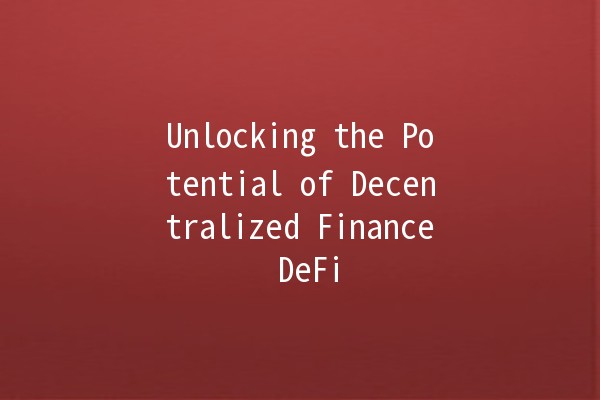
Decentralized ance, commonly referred to as DeFi, is spearheading a financial revolution. With its goal of democratizing financial services, DeFi aims to eliminate intermediaries, offering users complete control over their financial assets. The evolution of DeFi has paved the way for innovative financial products, enhanced transparency, and unprecedented accessibility. This article delves into the various facets of DeFi, providing practical advice and techniques for those looking to harness its capabilities.
Understanding DeFi and Its Importance
DeFi represents a suite of financial applications built on blockchain technology, particularly Ethereum. Unlike traditional finance, which relies on banks and financial institutions, DeFi operates on a decentralized network, allowing users to engage in financial activities with minimal barriers.
Tips for Maximizing Your DeFi Experience
As you navigate the DeFi landscape, consider the following strategies to improve your productivity and investment potential:

Explanation: Smart contracts are selfexecuting contracts with the terms of the agreement directly written into lines of code. Understanding how they function is crucial for engaging with DeFi applications.
Practical Application: Explore platforms like OpenSea and Aave to see how smart contracts operate. Take time to read whitepapers of DeFi projects to grasp their functionalities and risks associated with their smart contracts.
Explanation: Just as traditional investment wisdom suggests diversifying across asset classes, DeFi users should also spread their investments across different platforms and tokens to mitigate risks.
Practical Application: Invest in a mixture of Ethereumbased tokens, stablecoins, and liquidity pools. This approach minimizes the impact of potential losses from a single investment.
Explanation: The DeFi landscape evolves rapidly, with new projects launching frequently. Staying informed is essential for making educated investment choices.
Practical Application: Follow industry leaders on social media, subscribe to DeFi newsletters, and participate in online forums. Websites like DeFi Pulse and CoinGecko can provide updates on market trends and new DeFi developments.
Explanation: Yield farming involves lending or staking your cryptocurrencies to earn returns on your investment. It can provide lucrative rewards, but understanding the associated risks is vital.
Practical Application: Research platforms such as Yearn.finance or Compound, which offer yield farming opportunities. Assess the risktoreward ratios and understand the impermanent loss concept before committing your funds.
Explanation: Security remains a pressing concern within the DeFi sector due to its decentralized nature. Protecting your assets should be your top priority.
Practical Application: Use hardware wallets for storing your cryptocurrencies, enabling you to keep your assets offline. Stay vigilant against phishing attempts, and ensure that you're interacting with legitimate DeFi platforms by verifying URLs and examining social media accounts.
Common Questions About DeFi
What Makes DeFi Different from Traditional ance?
DeFi eliminates intermediaries by utilizing blockchain technology. Unlike banks, DeFi platforms operate on a peertopeer model, enabling users to take control of their assets without thirdparty involvement. Additionally, DeFi offers greater transparency, provides more accessible financial services to unbanked populations, and utilizes smart contracts for automated transactions.
How Can I Start Using DeFi?
To begin your DeFi journey, you must first acquire cryptocurrencies, typically Ethereum. After setting up a secure digital wallet, you can explore DeFi platforms by connecting your wallet. Consider starting with simple transactions, like trading on decentralized exchanges or lending your assets, to familiarize yourself with the process.
Are There Any Risks Involved in DeFi?
Yes, there are inherent risks in DeFi, including smart contract vulnerabilities, impermanent loss during liquidity provision, and the potential for scams. Conduct thorough research before investing in any DeFi projects, utilize reputable platforms, and never invest more than you can afford to lose.
What Are Liquidity Pools, and Why Are They Important?
Liquidity pools are collections of cryptocurrencies locked in a smart contract that facilitate trading on decentralized exchanges. They enable users to trade assets without relying on a centralized order book. Providing liquidity can also earn you rewards, making liquidity pools an attractive option for passive income generation.
How Do I Choose a Reliable DeFi Project?
To identify reliable DeFi projects, analyze their team background, community engagement, and the project's roadmap. Look for audit reports conducted by certified auditors, as these provide an essential layer of security, ensuring that the smart contracts are free from vulnerabilities.
What Role Do Stablecoins Play in DeFi?
Stablecoins are a crucial component of the DeFi ecosystem as they provide a stable value, pegged to a fiat currency or commodity. They facilitate transactions and reduce volatility for investors. Users can adopt stablecoins to participate in DeFi lending or yield farming while minimizing exposure to erratic market fluctuations.
By adopting these techniques and remaining vigilant, you can successfully navigate the dynamic DeFi space, unlocking its potential benefits. Engage with the vibrant DeFi community, absorb new knowledge continuously, and explore innovative financial solutions to elevate your financial strategy. The world of DeFi is everevolving, and with informed participation, users can not only enhance their financial journey but also contribute to the broader mission of decentralization and financial inclusion.

